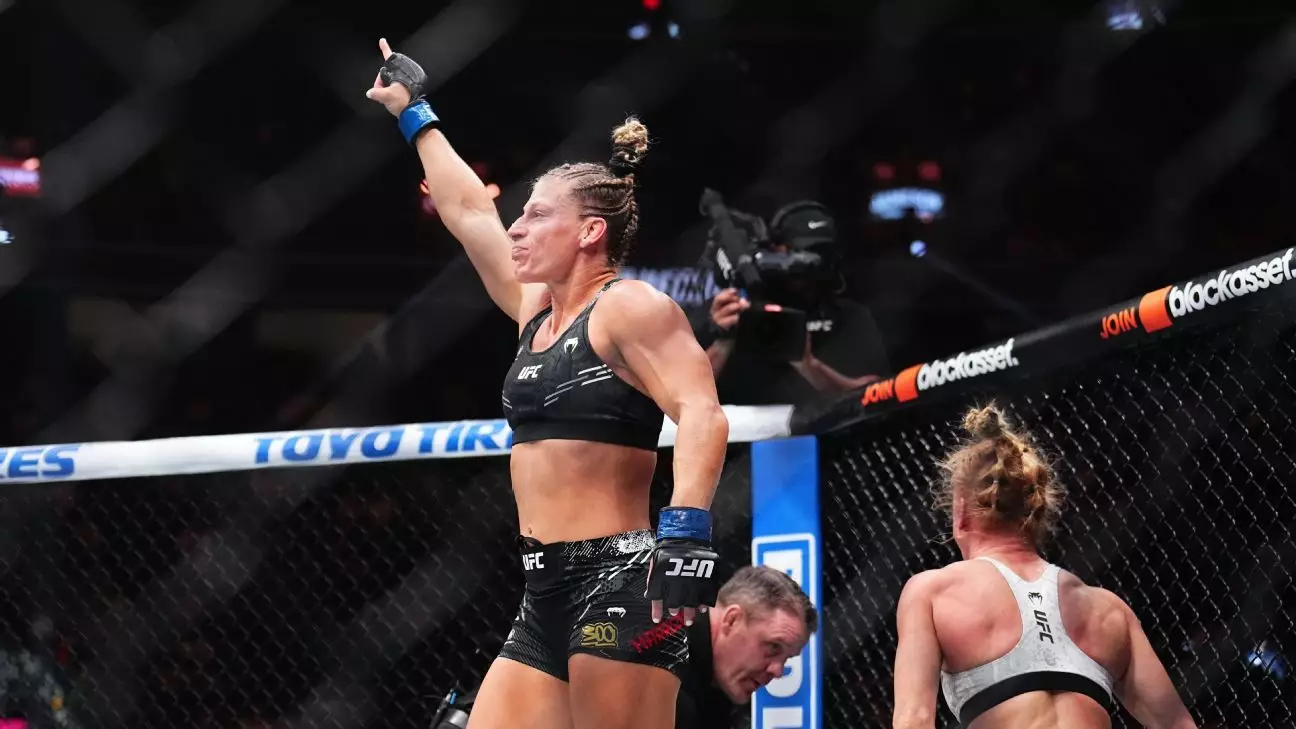Kayla Harrison’s ascent in the world of mixed martial arts (MMA) exemplifies the potential for resilience and grit to override the challenges posed by skepticism and criticism. As the UFC’s No. 3-ranked women’s bantamweight, she stands on the brink of seizing her opportunity for championship glory at UFC 307, where she will face Ketlen Vieira on October 5. The stakes are undeniably high, with the victory catapulting the winner into a title shot against the reigning champion, Raquel Pennington, or former champion, Julianna Peña, both of whom have expressed reservations about Harrison’s rapid climb.
Harrison is no stranger to the animosity that often envelops high-stakes matchups. Her critics, particularly Pennington and Peña, have accused her of “skipping the line” in her pursuit of the 135-pound championship. This insinuation highlights an underlying tension not just between fighters, but within the competitive nature of the sport where rankings and reputations can be fragile. Harrison dismisses these claims firmly, noting that her achievements and skill level are sufficient justification for her rapid progression. “I think everyone knows that it is only a matter of time before I become champion,” she stated, subtly hinting that her ability is recognized even by her detractors.
This situation provokes reflection on the often subjective nature of legitimacy in sports. What constitutes fair play in advancing one’s career? Should prior accolades from different fighting platforms, such as Harrison’s success in the PFL, be considered valid in the context of UFC competition? This ongoing debate accentuates the nuance of how fighters are assessed and how they navigate their careers in a hierarchical sport.
Tensions escalated when Peña made allegations regarding Harrison’s past use of performance-enhancing drugs. Such accusations threaten not only a fighter’s reputation but their entire career, igniting a firestorm that can overshadow their athletic achievements. Harrison’s response to these allegations is both robust and dignified. Rather than succumb to the negativity, she has chosen to view such claims as reflections of her hard work and success. “I consider it a compliment,” she remarked, emphasizing her dedication and commitment to clean competition.
The narrative surrounding this controversy raises interesting questions about the intersection of jealousy and ambition in competitive sports. It’s not uncommon for athletes to experience resistance from their peers; in this case, Harrison’s success invites skepticism that often arises from insecurity in others. Harrison’s assertion of her natural athletic prowess not only seeks to reaffirm her commitment to integrity in the sport but also frames the conversation around hard work as a cornerstone of achievement.
Harrison’s defense against allegations of cheating is underscored by her history with drug testing in the sport. She draws attention to the rigorous standards she is subjected to, revealing that she has been tested ten times in a single year—more than any other female fighter in the UFC. This factual rebuttal serves a dual purpose: it glorifies her commitment to fair play and paints a stark picture of the scrutiny under which top athletes operate. The rigorous drug testing in MMA aims to ensure a level playing field, and Harrison’s transparency about her own testing history further strengthens her argument for accountability.
Ultimately, Harrison’s narrative encapsulates a larger theme pervasive in the world of competitive sports—the challenge of overcoming adversity, whether that be through personal struggle, skepticism from others, or external criticisms. Her journey to uplift and honor her commitment to clean competition represents not only her trajectory toward a championship but serves as a universal story of triumph against the odds.
As UFC 307 approaches, the Los Angeles fighter remains focused on her upcoming bout and the championship that lies in reach. With each passing challenge, Harrison not only seeks to conquer her opponents but also dismantle the weight of doubt they attempt to impose upon her. In doing so, she embodies the true spirit of an athlete committed to excellence both inside and outside the cage.

